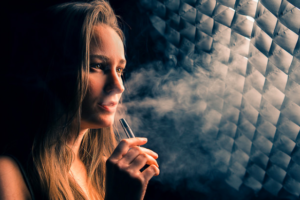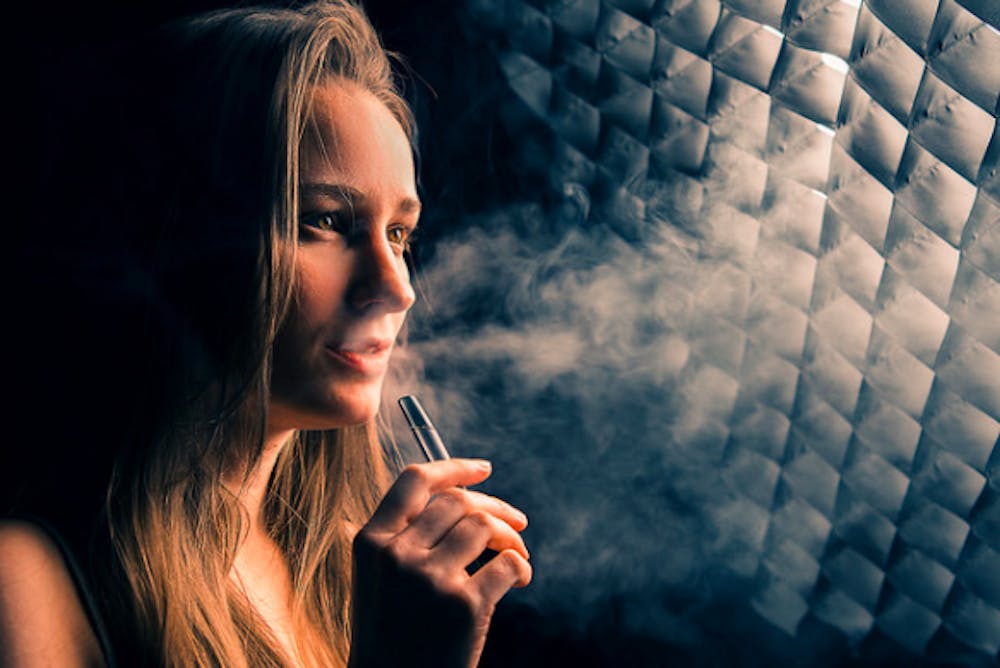By Len La Rocca
Distribution Manager
You drop your bag at the lunch table, grab a bite to eat and on the way to your next class, vape up some clouds of undetectable, concentrated cannabis oil.

Student smokers no longer exude the potent smell of marijuana in its original state, which alarms both College advisors and law enforcement. Smoking methods that require the original flower form of marijuana such as joints, blunts or bongs that emit the alerting smell are seemingly obsolete.
This common routine for students has become a concerning phenomenon to Janice Vermeychuk, the nurse practitioner director at Student Health Services.
Smoking concentrated THC oil through a dab pen or cartridge has been the drug of choice for college students for the past year — it is odorless, convenient and undetectable. Using a dab pen to heat liquid marijuana produces what people call, “ninja smoke.”
Although this has made the product desirable to students, its unknown health implications have been putting students at risk.
“Because cannabis is federally illegal, there has been almost no solid research about electronically vaping marijuana oil,” Vermeychuk said.
While there has been little research on cannabis oil vaping specifically, studies on vaping in general have produced negative results. According to the Centers for Disease Control and Prevention, the aerosol that is inhaled through vaping can contain harmful substances such as nicotine, diacetyl, which is linked to lung disease, volatile organic compounds, cancer-causing chemicals and heavy metals such as lead, nickel and tin. Additives and flavoring of cannabis oils are also known to have adverse health effects.
“Oil cartridge vaporization could be harmful. There are additives such as polyethylene glycol, propylene glycol and more recently, cannabis terpenes,” Vermeychuk said. “They convert to carcinogens (cancer-causing agents) at a relatively low temperature.”
These man-made chemical additives are used to extract oil from the flower form of marijuana and give the oil its liquid presentation.
In addition to the unknown health consequences that this oil causes, a dealer looking for a quick buck is another cause for concern. Dealers are able to multiply their profits by diluting the mixture with nicotine vape juice, cough syrup and synthetic marijuana oil – you never really know what is in that cartridge.
“Some people fill them in themselves and cut them with (nicotine) vape juice,” said a sophomore biology major. “I wouldn’t be surprised if people are having health problems.”
Even if the product is purchased legally, buying a cartridge of cannabis oil from a reputable dispensary doesn’t ensure safety.
“The concern is that the market is being flooded with substandard products with questionable safety,” Vermeychuk said. “They have no idea how serious any of the health threats might be.”
Students have admitted that there has been a noticeable difference in their health since picking up the habit.
“I’ve used them on and off for about two years and I’ve definitely been noticing some angina and chest discomfort at times,” the biology major said. “Substance abuse has never been easier. And most packaging is so vibrant. It’s hard to imagine it has any repercussions.”
A freshman business major said that until more research is available, students should avoid vaping.
“Most people don’t look into what is in their cartridge and it’s dangerous,” he said.
Similar to the fruit-flavored nicotine pods from the vape company, Juul, which recently had its popular mango-flavored nicotine pods banned by the Food and Drug Administration for encouraging underage vaping according to CNBC, cartridges also come in an assortment of flavors.
“In September 2018, the FDA announced that the use of vapes among youth had reached epidemic proportions due to kid-friendly marketing and appeal of these products,” Vermeychuk said.
These appealing flavors, such as sherbert, birthday cake and vanilla ice cream, come in colorful packaging that have also been replicated by dealers looking to give off the appearance of big company backing.
“They were good and really changed smoking when they came out, but recently there’s more and more fakes laced with cough syrup and K2, or synthetic marijuana,” the business major said.
While some with a more lenient attitude toward cannabis oil may just wait to be presented with more research on the substance, Vermeychuk takes a firm stance against the practice.
“You are inhaling chemicals into your lungs,” Vermeychuk said. “Why would anyone want to do that?”
Some sources in this story have been kept anonymous in order to avoid a risk of possible legal or disciplinary ramifications.







